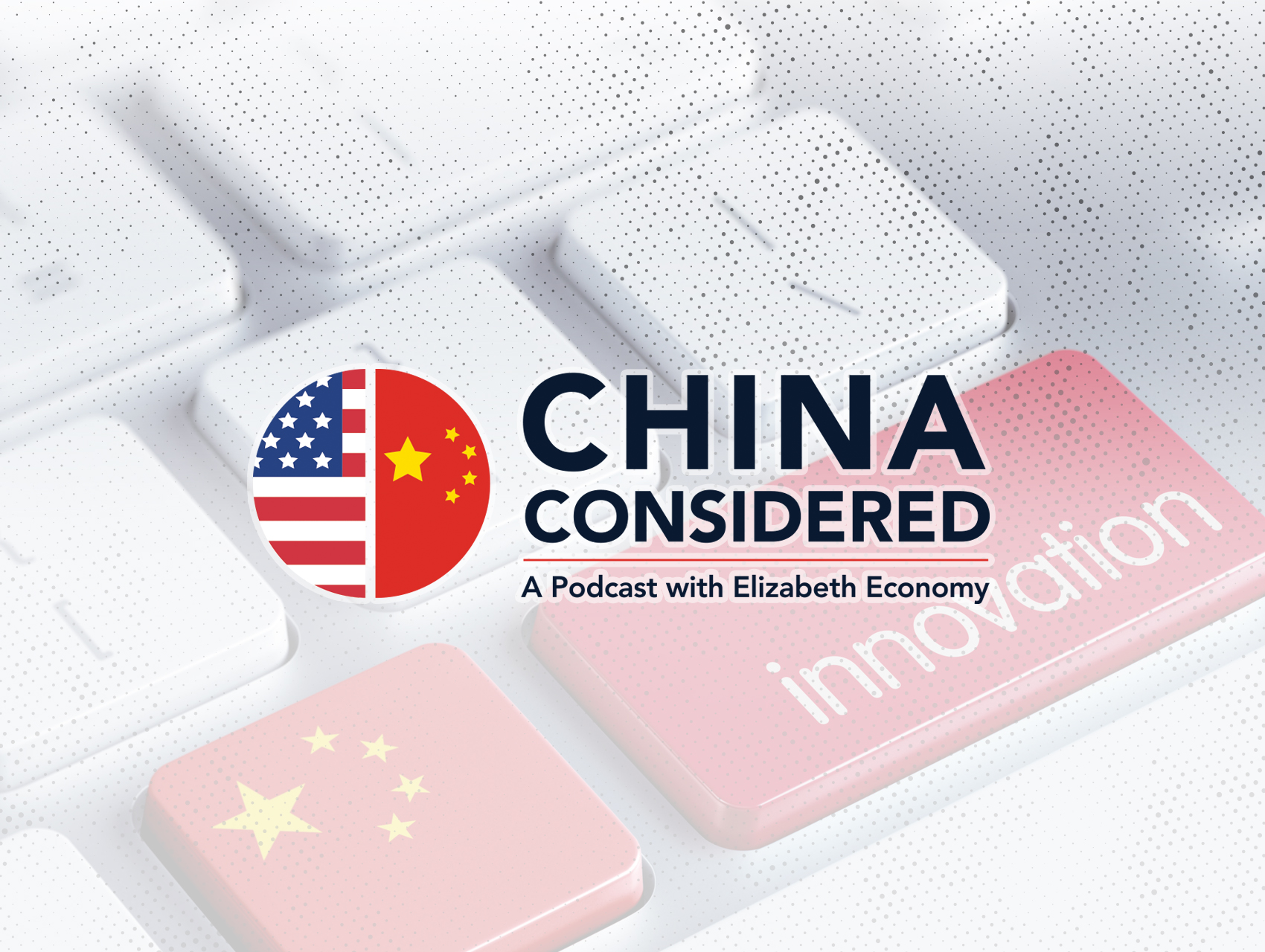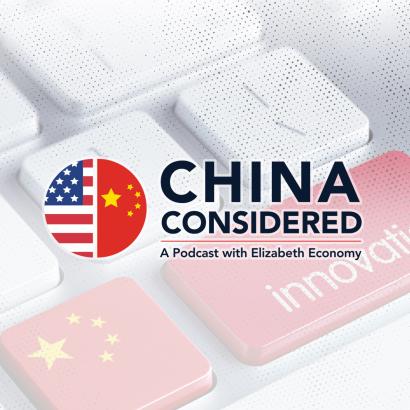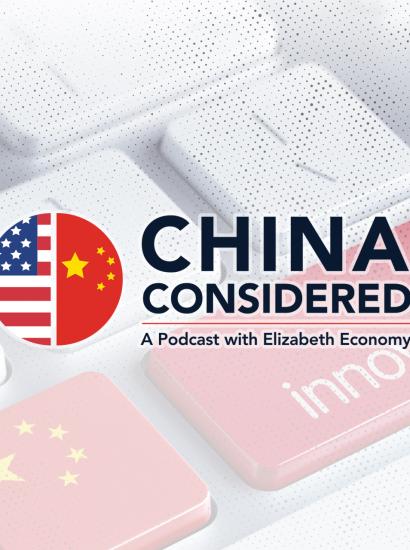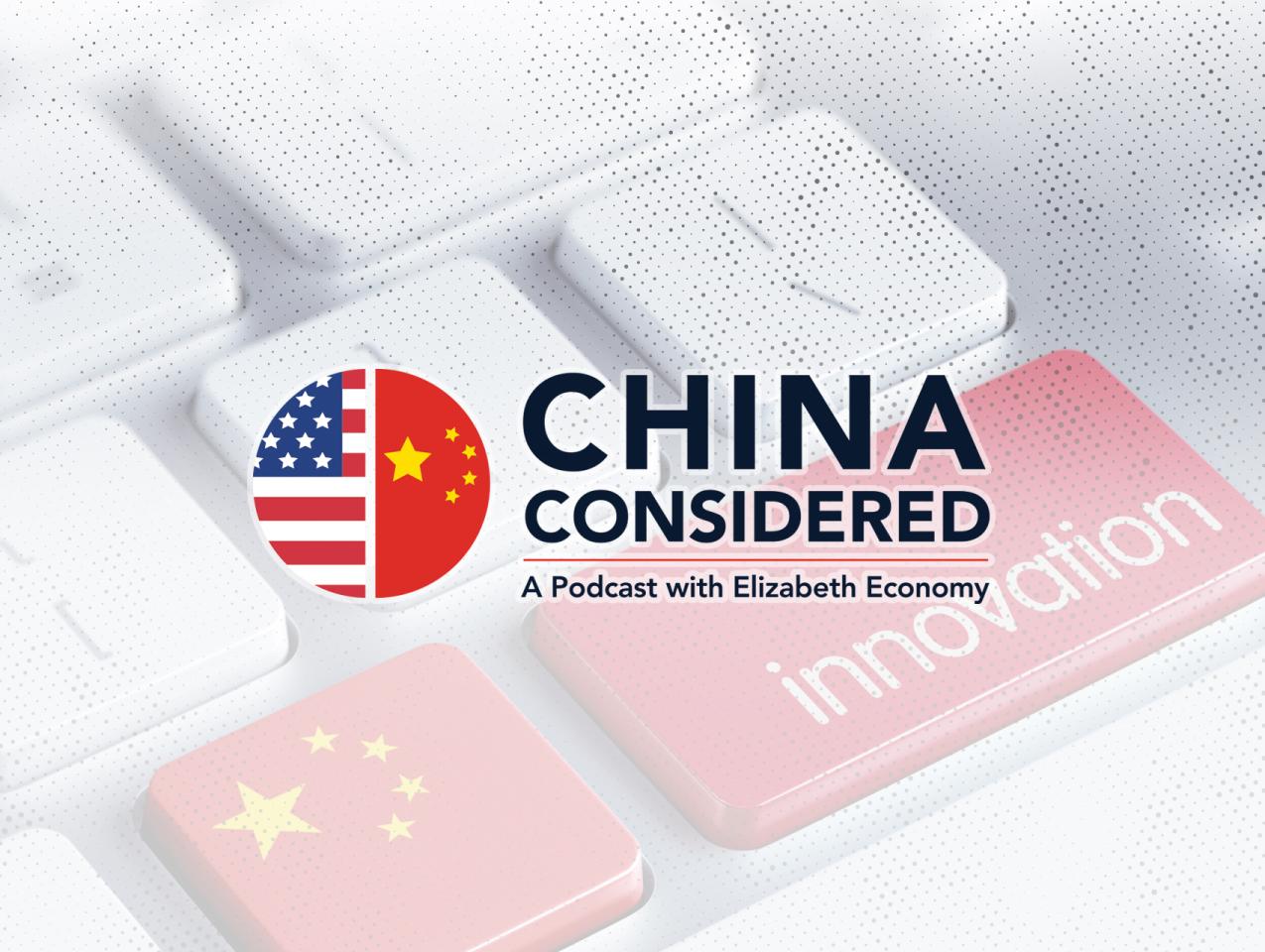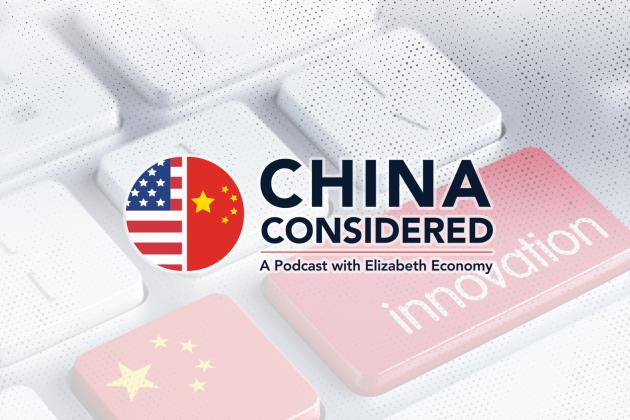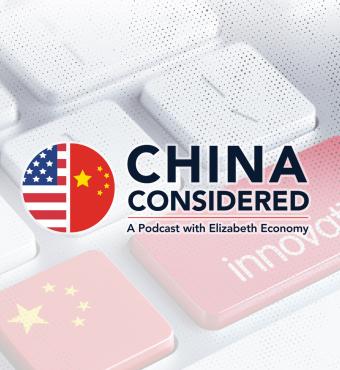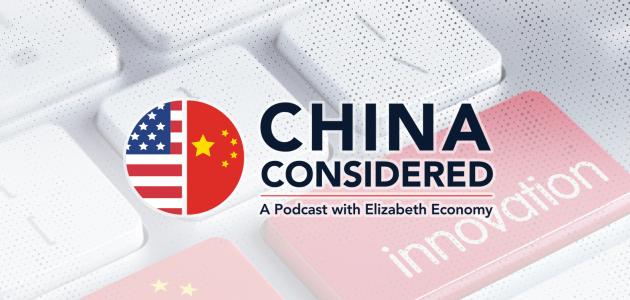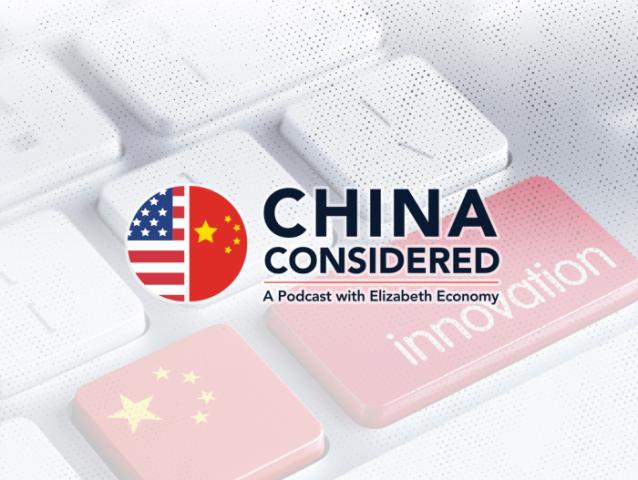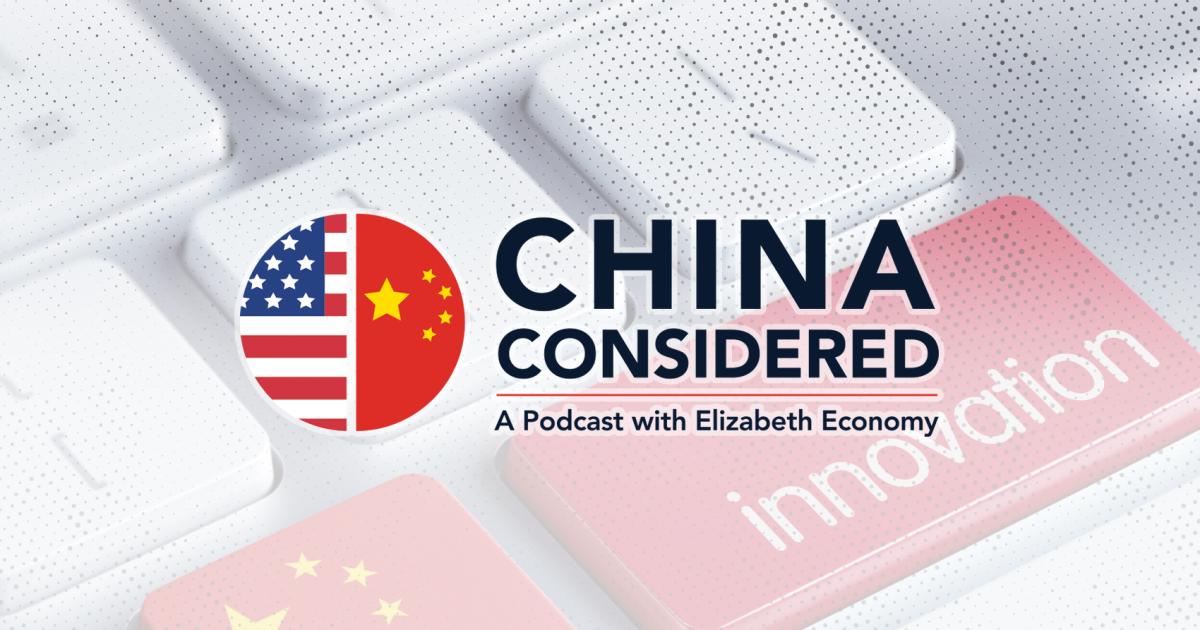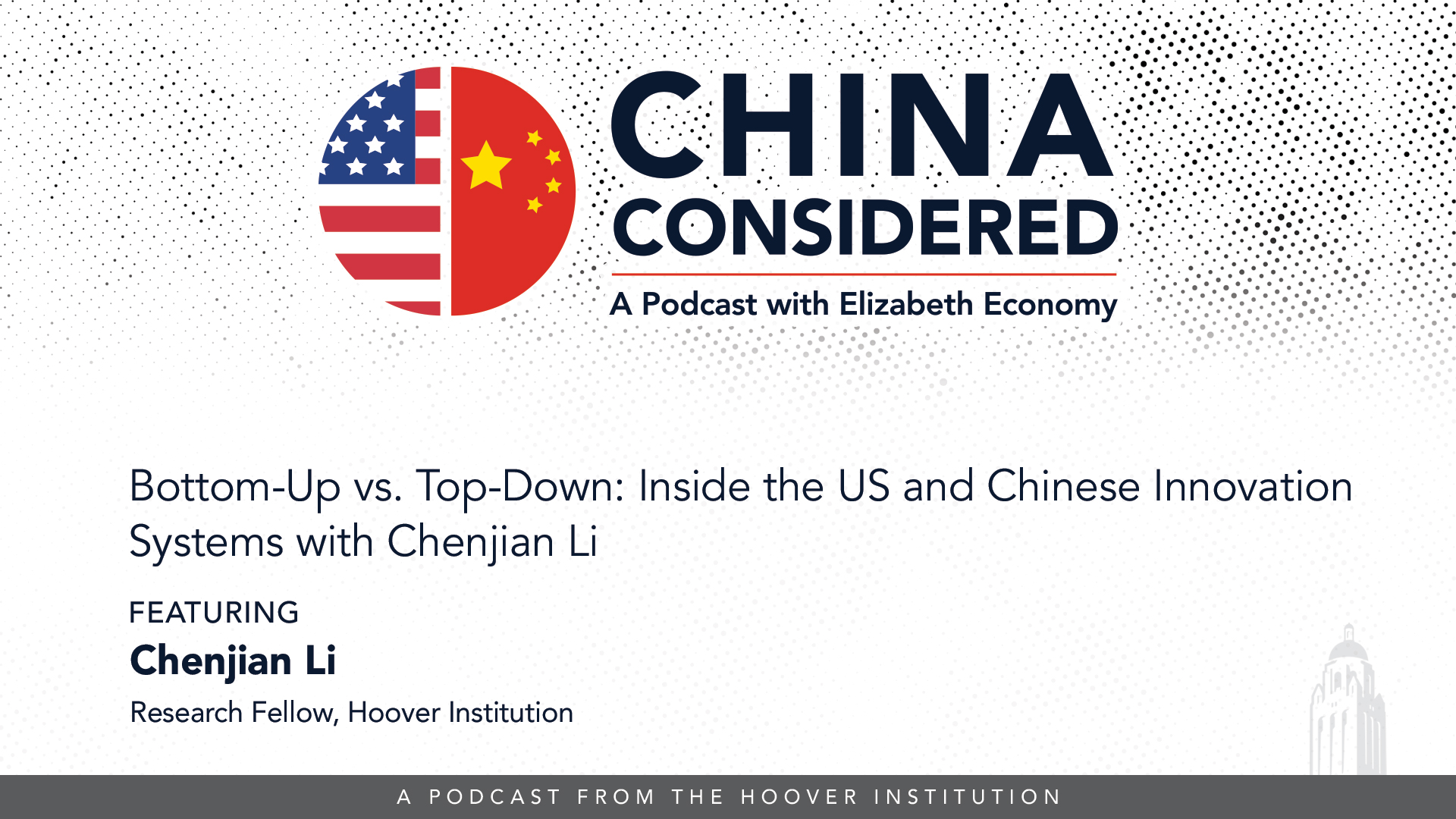- China
- Economics
- Science & Technology
- Innovation
- Confronting and Competing with China
Host Dr. Elizabeth Economy interviews Dr. Chenjian Li, discussing the fundamental differences between the Chinese and US systems. He highlights China's rapid progress in biotech and pharmaceutical development, predicting the country may produce its first truly innovative drug within five years. While the U.S. excels at "zero-to-one" grassroots innovation stemming from decades of basic research, China has traditionally focused on "one-to-100" government-supported scaling and is now increasingly investing in breakthrough innovation. The conversation concludes with Dr. Li's recommendations for U.S. competitiveness: continuing robust basic science funding, maintaining large-scale translational research programs, and preserving America's traditional openness to global talent, which he argues brings not just technical expertise but also scientific thinking and open inquiry to societies worldwide.
Recorded on October 1, 2025.
- Welcome to China Considered, a podcast that brings fresh insight and informed discussion to one of the most consequential issues of our time, how China's changing and changing the world. I'm Liz Economy, Hargrove Senior Fellow and co-director of the Program on the US, China, and the World at the Hoover Institution at Stanford University. Today we're gonna speak with Dr. Chen Lee, a renowned molecular geneticist who's on lead from his position as university chair at Ping University to spend time here at the Hoover Institution as research fellow Dr. Lee has worked inside both the Chinese and American research systems. And we're gonna talk about how those systems differ and what those differences mean for the future of biotech innovation and global competition. Welcome cj.
- Thank you, Liz, for inviting me. And I've been watching your, this episode by episode and I'm glad I can contribute. And thanks for everybody for tuning in and listen.
- Okay, so let's start, you know, from a big picture, you have the rare really experience of having spent decades in both United States and China as a leading innovator and leading neuro neuroscientist. As you think about the systems, the research sort of ecosystems in both the United States and China, what do you see as the relative strengths and weaknesses of each system?
- It's a great question. I think in discussing that, I wanna put something right upfront, which is China is developing very fast. So whatever we saw 10 years, five years ago may or may not apply to today. So I'm trying to add a dynamic sense of that. If I have to characterize the two systems, if interestingly, I will say it's very similar to the economic system in which in the United States, the strength is really bottom up grassroots innovation. And on the China side, it's really a government supported top down approach. For example, in the United States, almost every innovation comes from basic research that stems from decades and decades of professor's work, sometimes obscure. And nobody knows what this guy's doing for many, many years. And the society as a whole, especially the universities, just supported them for decades and suddenly it boomed. So it's very grassroots oriented. The system is great. And that system is particularly good for what we called zero to one kind of innovation development from nonexisting. Nobody imagined that. Two, it's actually may work. For example, in ai, in gene editing, all of that comes from decades of work that people used to laugh at the word in artificial intelligence, right, for decades and suddenly it boomed. So United States is extremely good in that. Now China is catching up fast, but so far the way I think it succeeds is still in the, not zero to one, but one to 100 that range it's government support. And I should point out not only central government, but local government. And that is very strong. So for example, if you do have a field that they think is important, for example, battery, green energy, if they identify that as a particular field that is important, they pull billions and billions and they're very patient. So that is what they're good at. But now I think China is learning from the United States and trying to strengthen the quote unquote zero to one innovation side. So that's the biggest one I can describe.
- So let me pick up on two points. Number one, how do you think China is strengthening to the zero to one? Is it because it's investing more in basic research? Is it because Chinese companies are becoming more engaged in basic research or what's changed to make China become better at it? And then you mentioned sort of the past five years as a period of acceleration in China. To what do you attribute that sort of acceleration period?
- Yeah, there are several things I can share. First of all, I think China has been pretty strong, supportive in basic research from very early days. It was a matter of just no money, no expertise, and no international exchange. And with things like a cultural revolution, it really destroyed that side. But in, in the blood, I think the appreciation for basic research has been there. It was revitalized after 1976 when Deng Xiaoping came to power and reemphasize that science education research is important. And that has not changed in the administrations after Deng Xiaoping. So whether it is ING government or Hu Jinta or the current one, they pretty much support and realize the importance of basic research. So that has always been there. But the, the support wasn't enough. However, in the past years, I will say after 2000, the reestablishment, the recovery phase basically was done. And then it's playing catch up in, in some fields it's actually leading. So now government officers as well as people are seeing the fruit of supporting basic research. And I think the enthusiasm is now at another level. Plus overall the Chinese society is much richer than 30 years ago, right? It does have the resource to throw around. So that gives that practicality say, look, if you wanna have a a result, I'll give you 30 million Chinese r and b without blinking of an eye. So go ahead and do it. That is new. And so it's, it's a positive cycle moving forward. And of course after mimicking going behind people for a long while, people realize that, why don't we innovate? I mean, there's nothing stopping Chinese scientists and engineers from inventing something just new. So I think of the combination of that makes now an unprecedented way of focusing both on the zero to one and the one to 100.
- Yeah, I mean it's always been my sense that China's been very good at the sort of process innovation, right? Making things better. Yeah. Whether it's making them run faster or be more efficient or whatever it may be, faster acting. They're very good at that, but they haven't been as good at sort of breakthrough invention. Right. The sort of what you're, what you're talking about with the mRNA, you know, based vaccine, that's, you know, something that came out as you said, of decades of research, you know, in the United States and Europe that weren't really present in China. But now you're saying the fruits of the basic research are coming to to bear. Are there particular areas where you see China as like on the cusp of that breakthrough invention or where you would say they actually have already had kind of a breakthrough invention? Something truly new has emerged?
- There are several that in my field I know, but beyond that, I'll mention several. I think the green energy, battery science, and technology are clearly seen by the world as very, very good rare earth material. I want to emphasize that it's not just a very wasteful, environmentally unfriendly thing. It's actually four generations of scientists in engineering starting from picking university professor, improving the efficiency and how well it can be done in my field. I can dig, go deeper if you allow me, of course, the aspiration of inventing, for example, new treatment, new drugs for combating human diseases has always been there. Remember, the only Nobel laureate from China
- Is a woman
- Who's exactly you Dr.
- Yes,
- Yes.
- She is a women scientist. And remember, she, her work is entirely done in China during cultural revolution.
- Yeah. - Unbelievable. As it is, it's treating malaria. So the inspiration aspirations always been there, but for a long, long time, remember China's biomedical research has been lagging and it was almost destroyed during cultural revolution. So from 1976 to year 2000 ish, it was a recovery time. But then after that, things changed. Just as an example in the pharmaceutical industry that I'm most most familiar with. So the first phase was doing generic drugs, generic drugs. Are those drugs already on the market been used and the patent expired. So you make that. So that was the first phase. And then the second phase is called me. To me better, meaning there is a target validated, there is a drug, but I'm trying to make a drug which is either more effective or with less side effects, somehow me, to me better. It's a little less challenging, but still very, very good. The third phase Chinese companies and schools experienced was called close follow. It's more advanced than the me to me better because it starts when the drug is not on the market yet. For example, if let's say Merck has a drug in phase two clinical trial, then the Chinese company say, looks like very promising, let's do it. So that's the close follow phase. And now I think many, many of the pharma or startups are eyeing on truly innovative first in class and in our field it's called the crown jewel, sort of that kind of achievement. And I can see a lot of people are doing that with government support, with private investment. So far China is yet to come up with a true first in class. But I predict, given another five years, I will be surprised that there is no first in class. I expect that there're probably going to be one.
- Yeah. And I think China's always beating our expectations in terms of how fast they are to accomplish things once they sent, set their minds to it. So it may even be faster than five years. It
- Could, it could, yeah. I, I know several of that, including one of mine. It, it's kept coming. What if,
- Oh, can't we claim, can't we claim yours for, for United States?
- Absolutely. Come.
- Are we, maybe, maybe it'll be a good sign of, of US China cooperation. Yes, you yourself are a sign of US China
- Cooperation. Yeah. Liz, I wanna add another one, which is even the zero to one innovation, I will say there is a varying degree of difficulties. Hmm. Some of them really, it will take a genius like Einstein sort of new to that kind of people. Other ones are manageable. Dr. Yoyo too, she was looking at how to treat malaria, period. You do everything possible and that kind of things. It doesn't need Einstein, it only need needs pretty good people. Really hardworking.
- Yeah. Maybe a little bit better than pretty good people, but Sure. Okay.
- Then not only China, I think Europe, many Japan, Australia, they all have this capacity. Right. In that sense.
- Right. And that's a, I think that's a really important point. So let's, let's pick up on that issue of, of talent. You know, one of the things that people in the United States tend to obsess over is, you know, when we see these big numbers, right? So China's graduating, you know, 4 million STEM students annually compared to 800,000 here in the United States, of whom, you know, many are also from China, by the way. At the same time, China has a big youth unemployment problem. We know somewhere between running between 15 and, you know, 20% over the past few years with a lot of graduates who can't find work is, you know, what is the reality of sort of the, the China sort of stem student talent pool? You know, first of all, you know, are those 4 million all sort of first in class graduates or is there a range, an array kind of, of of, of scientific ability, research ability and you know, does it include people, for example, who've finished, you know, two years of an engineering degree or something like that? And then, you know, what about the match between the 4 million STEM students and the labor market in China? Is there room for all of them to be employed? Or are those, are those high youth unemployment statistics, you know, related to, you know, people like me, social scientists, and others who simply can't find jobs?
- Well, you have a very good grasp at science and technology questions too, Liz. I think your, this question actually can be subdivided into several sub questions. One is we compare the most innovative group of layer of people, which people, I mean here in the globally, look at that. But there's also the next layer of good engineering's students and engineers who can carry out not that creative, but enough and important solid work, right? So these are very different. So I think it will be fair to compare the top tier to top tier, middle to middle in the top tier sort of students and, and talents. I will say United States is still minute, you and I, we are blessed to be at a place as at Stanford, right? And I was lucky enough to work at Rockefeller University. There is a teeny tiny institution with 72 labs, but we, we had 26 Nobel Laureates,
- A hundred incredible research institution,
- Perhaps it's unbelievable. And I worked at Cornell Mount Sinai. So the top tier to top tier, I think United States is still better in that sense, the most creative ones. Now, I also worked at Peking University and the Peking Union Medical College, another school established by Mr. Rockefeller in history. And I think top to top, I would rank Peak University, Xing Hui University around 20 or 25 in that range compared to US elite schools. And that is very competitive. But still, I think there is a, there's a small gap there. Now, the next level is quite different. The story, Chinese universities and technology schools are producing very good engineers. They are good at a particular field, particular technology. And they do that day in, day out. And in that sense, that layer, I'm not sure United States has such a, a big advantage.
- Maybe no advantage. In fact,
- I I I hesitate to say that
- I think you can say it. I think you can say it.
- No, actually, I honestly doubt that because I don't have real experience in that. Right. By the way, Purdue University, for example, established a new sort of school or department really focusing on the chip manufacturing.
- Yeah.
- So their claim is don't always just take pride in the design, in the best cutting edge, but it's important to, to be able to produce it.
- Right. And
- I applaud to that. Yeah. United States used to be the country for manufacturing, right? Look at our steel, automobile, chemical engineering, pharmaceutical ingredients, everything. And now in the past 30 years, I think us sort of gave up on that quite a bit, right? Right. In China,
- I mean, we have no nuclear, we wanna revive our nuclear industry, but we're hard pressed to find many nuclear engineers. We simply don't have that many that even teach that. Right?
- So even chip, chip engineers, right? Yeah. So I think in China, in the past 30 years really is leapfrogging
- Yeah.
- Forward. It, it just jumps up and up. So I think that layer United States has some catch up to do because the economy system doesn't quite reward the engineers, right? So those two are, I think this is how I feel in general. But in China there is a very big unemployment problem because you produce so many college students and, and university students. But the job market is not as good as it was, let's say, five years ago or 10 years ago. So I think the mismatch is clear and that has caught attention by the government, by entrepreneurs and educators. But the solution is something I do not have. How can they solve the problem of unemployment? Because remember last year, college grads were about 12 million and up. And how do you find jobs for all of that when the economy is shrinking? Yeah. So that will remain as a challenge.
- Yeah. And and what about the collaboration between academia, between the university and industry? I think this is a really important story in China. How ecosystems develop right? From the university, you know, to manufacturing, you know, and just scaling up where the money coming from the central government can be quite crucial. Can you talk a little bit about that process in China where you think it, how you think it works and, and does it work as well as, for example, I think it does,
- Liz, again, I like the word you used, develop, evolve. Because it, it is really changing fast. Remember in 1976 it bin says, we, we need education, we need science and technology. But before 2000 I was in, it was a catching up. The real research that can be translated into a product came even later than that. 'cause you need about a decade to accumulate great research that is actually not just fooling people, fooling ourselves, but actually can turn into either a chip or a medicine or a medical device. So I will say it's really after 2010 ish, there are enough good things that can honestly be turned into a product. So I will say for the past 15 years, that has been growing and P University was among the first ones to even have a tech transfer office.
- Yeah. - As bad as it, it was, but it's learning fast.
- Yeah.
- So it supports people to do innovative work. Now here is what the top down system is not as flexible, supportive as that in the United States. Stanford is really one of the best examples of how things turn out to be from research to the development to a final product. Right? Many of our graduates are really, really shakers and movers in this in different fields. And in China it's been developing. So suddenly the professors, when they're trying to establish something, they're not regarded as doing something irresponsible, extra. They're not looked down upon anymore. They are encouraged to say, well yes, you, you, you can actually do that. And for example, the system that allows leaves of absence, right? Was established only a few years ago. Surprise before professors, when they do something, they have to do it sneakily, right? You have your day job and your a hundred percent. Now you can actually say, look, I need a year off to get a startup working. All that came within the past 10 years. And they're catching up fast. I wanna tell you something recently that I think developed in China, and I think it's extremely powerful and potentially important, which is what I called the Bridge Over Troubled Water project. So for our, for us professors to go from basic research, publishing great papers to an actual project development to a product, whether it's a drug or device, the first phase is always the hardest for us. That is the time we need some funding to move from a laboratory to a startup company. And the amount varies between, let's say half a million to 2 million to about no more than 5 million US dollars. That usually is a very hard obstacle for us because, I mean, Stanford professors are not poor. But coming up with $5 million, put it on a project, it's hard. Here we usually use angel investors,
- Right?
- That way of supporting it. It's a totally market economy. But in China, they're not doing it slightly differently. So it's a government support plus investment. And the way they do it is, we'll give you the money you need. And as a grant, now we all know 90 to 95% of startups go bankrupt within five years. And they say, that's okay, we understand that. However, if you do succeed, we want a share of your company. So in that sense, it's similar to convertible notes kind of investment vehicle. And only thing is the government is doing it, the university is doing it. That I think is a huge booster because many, many, many professors will be saying, yeah, I will wanna try it and I'll be responsible. No one wants it to be more successful than I, right. However, if I fail, I'm not going bankrupt. I can still have my regular job. I think give it 20 years this policy, the bridge over troubled water or flying over the Death Valley. Two metaphors. I think it's gonna be really powerful.
- Yeah. I still remember it was a number of years ago when Li Chuang was in power. He instituted a new policy to let university students leave for a year or so to do a startup. And I thought that is the beginning of a really big shift in Chinese thinking. Because you know, before that, I know I had done some interviews in China with technologists and they would say, you know, none of the Chinese parents wants their child to go and and do a startup to try to be an entrepreneur. They want them to go work for a big company, either a western company or a state-owned enterprise and have job security and make good money with good benefits. But I think when Leika ch you know, pushed forward with that initiative, it really began to crack open a system in some ways, you know, China a very, has had forever, you know, a very large entrepreneurial spirit, which had become, I think, encased in the political structure in a way that that sort of sometimes smothered it. So I thought this was a really, just a really interesting and important moment for the young people in the country to,
- Yeah, Liz, I, I can tell you an interesting story in that line. 'cause at that time I was the vice provost for P University Oh. And dean of the UMP college, we actually allocated a really big sort of a floor of a particular building to be the innovative center for students.
- Oh, wow. - And in my UMP college, we were the first one to say, it's okay if you leave for a year, no problem. We'll support you. And so on and so forth.
- Yeah.
- And I was very happy to see that the students actually, I think zero came out of that from those things. That's, that's not the point. That's the point is students at that age, they are daring.
- Yeah. - They, they are actually writing their business proposals with great market analysis and all that competitor analysis. So these people, although they failed at their first project, but give it another five, 10 years, they were exposed to the entrepreneur kind of thinking. And they're not afraid of it. They no longer look at Steve Jobs as a, as a God. And they look and say, oh actually if there's a good idea, I'm willing to do it a second time. Right. So I think just to supplement your observation with
- No, and they don't need to look at Steve Jobs anymore anyway. They've got Jack Ma, they have their own, you know, sort of stars, homegrown entrepreneurs who've really done exceptional things. So I wanna switch gears a little bit to an issue that I know you've thought a lot about and, and have some, you know, concerns about. And that is the sort of over reliance of the United States and much of the rest of the world on Chinese APIs. You know, talk to us about the issue here. What is the problem that you see?
- Okay, Liz, let's clarify the abbreviation API for the audience because most of people think in the, in the computer sense. Okay. The API we are talking about here is active pharmaceutical ingredients.
- Thank you. Yes.
- I think you are raising a very serious question. I think if I may, on a personal level, Liz, it's actually, I feel a profound sadness in discussing this question because to me, medicine treatment, these are the novel list and across humanity issues, right? And it feels, I feel the pain of discussing that in the context of geopolitical tension and risks. But we have to face it. So I think the problem is big, and I hope I'm not exaggerating because I do think it is as serious as weapons of mass destruction in the sense because those atomic weapons and all that, they're horrible. But the drugs we are talking about affects 80% of population, whether it's United States or other countries, including China. That's what API active pharmaceutical ingredients is about. The daily drugs like ibuprofen, the mundane ones are sleeping pills or let's say one has a a a needs a appendicitis. It is such a small surgery. What about the ca the anesthetics, if you go for a CT scan, what about the contrasting agents? So these are the things we're talking about. And I think there was a figure by FDA that people above 65 perc, 65 years old in the United States, I think it was 85 or 90% of people take at least one drug at least. So this is what we are talking about. If there is a breakage in the supply chain, we are talking about 80% of people will be affected. And the question goes beyond the United States, it's Canada, it's Australia. And to be serious, I think if we have such a kind of unfortunate situation, poor countries will suffer even more because the price will go up like crazy. And United States and Europe are probably okay because we, we can put up with higher price. But what about African countries? So I think the question is really beyond US China geopolitical now I see the problem is globally, I just feel for such critical things, chemicals and APIs to be so heavily depending on one place, right. That is dangerous. In United States, we have so many drugs and APIs, let's say 70, 80% is dependent on import. United States used to make all of them right? In New Jersey Then it was shifted to other countries. India being one. And then, and for interestingly, it started a race to the bottom of economy because it's, it's not that profitable. So whoever can make it cheaper and equal quality wins and give 30 years, Chinese companies are doing extremely well. They're making pro products for Merck, Pfizer, AstraZeneca. But if you trace back, it's all there now, geopolitically it is dangerous not only for United States, but for other countries too. So I will think for such kind of things, it might be a better strategy to have more than one place that can produce it in case it needs then you can crank up the production. But how to do it, I'm still,
- That was gonna be my next question. So what's the, what's the solution? I mean, you know, what do we do from here then? How do we break, how do we break this dependency? Yeah. 'cause I think there are two different issues right at hand. One is something could happen within China that could be problematic. So maybe there's a factory explosion. Yes. Yes. You know, and, and, and that provides some very serious disruption or, and that, and I think that is the sort of the global where it could have global implications or, and we've seen both China now and the United States, you know, weaponize their, you know, sort of when other countries have dependencies on them, you know, weaponize that kind of le leverage you could imagine as it did with a little bit of the mask diplomacy during CO that China could choose to use the APIs like it did with the rare earth, for example, recently as a tool of negotiation with the United States or with other countries with which it's having a difficult political relationship. And that really wouldn't probably have as much of an impact in Africa or other countries. But so, so what do we do about it, I guess is the question?
- Yeah. Yeah. I, I definitely feel, acknowledge that something, I'm really trying to think hard, but I haven't found
- A
- Good solution. But I will tell you what I've been trying to explore. One is of course, what they call the friend shore. If not United States, then India, some of the European countries or those are the places, or Mexico could be places that we can have friends. Sure. So just don't put all eggs in one basket. That's the strategy.
- Okay. The second, I mean, I think sense, oh sorry, go ahead. Yeah,
- Yeah. The second one, I'm, I'm throwing that idea out to be criticized. I think many people will say that's just not gonna work. I think why not invite some of the Chinese companies to have a subsidiaries in United States? Remember for example, attack was severely punished by United States government, right? Really, really hard time. The stock, I think dropped the 92% within two days, something like that. And then US government says, okay, we'll give you eight years. Because after looking at that carefully, it's, oh boy,
- Yeah, we can't live without it, basically. Yes, yes. Oops. Big surprise. Yep.
- But if you look carefully, woo, shop tech is establishing factories here in the United States. So is PAC Gene, so are many other con companies. I mean, of course they have their economic reasons, they have their sort of incentive to sp to, to spread the risk factors. But in the United States, I think we probably should encourage them to do so because in case of what something that we really, really don't want it to happen, those factories are actually in Texas, in Boston. And that will be a source of those drugs. And, and I will say that's at least something we should think about rather than rejecting that outright as another kind of economic invasion. So I'm thinking maybe we should think about this a little bit more, although I'm, I'm quite uncertain myself.
- Yeah, no, I think it's a, it's a really, it's a really big question that I don't think the US government has, has yet, I mean, has yet to address, basically. Yeah. And we certainly have seen it in, you know, battery technology with CATL and you know, do we want Chinese companies that are ahead basically of US companies or have abilities that US companies don't currently have to come here and to, to manufacture, to provide jobs all good. But does that then stunt the ability of, you know, homegrown US industry to develop and, you know, of course China's experience, you know, we could say, can we learn from the Chinese experience in the, you know, 1980s through the 1990s Yeah. Of welcoming that kind of foreign investment, but then requiring certain things from those foreign investors. Yes. In terms of r and d, you know, investment or tech transfer or you know, whatever, manufacturing a certain amount in order to have access to the market. They put in many, many different kinds of stipulations for access to the Chinese market. And I'm not sure whether Chinese companies will be prepared to respond in the same way that many American and other multinationals did when China was just opening up. Right. So I think there are some complicated, I think around whether or not the United States and other countries, right, feel as though they need to have their own indigenous to take a word that's often applied to China, indigenous innovation, indigenous industries, or whether we don't need to have that in, in every sector. And we should just in fact welcome the Chinese companies who are gonna be providing us with both the technology that we need and jobs.
- Yeah.
- So
- One thing, Liz, I wanna give an example to you. I mean, just look at Tesla, right? Elon Musk in, in Shanghai, Chinese government and local government really, really opened their arms to El mask and basically whatever you ask, we'll get it done next week, right? Something like that.
- Right?
- And their long-term thinking is just having you here, you train the workers, the engineering engineers, and the way you do things, we learn from it,
- Right?
- People can be transferred to the next xmi or, or or
- No, I think that's exactly right. Exactly right. That's exactly right. And if you read Apple in China, the book that came out not that long ago, that's exactly what happened with Foxconn and Apple Foxconn based in China though, right. And all of their engineers and all the, the training that Apple did then went out to seed many, many other parts of sort of the iPhone ecosystem, for example, throughout China. So it's a really fascinating story that does, I think exactly what you're saying and maybe a really important point to make in the context of what the US could gain from this process. So I'm really glad that you, you raised that. I think it's,
- And Liz, I do have a suggestion, again, a quite premature one. I think we can select areas and factories or companies that we really want to learn from. For example, if there, there's a company who does pretty ordinary things and just compete with US companies, we probably don't quite welcome that. However, if it's battery technology, which is prominent, we may wanna learn from them.
- Right.
- You know, another one I want to graze in awareness is China is no longer the one 30 years ago that basically people here always thinks that Chinese stole things from United States. True or not? Today, I think there are some fields Chinese already leading.
- Absolutely.
- And for United States, I think we should be confident enough to learn from the best, whoever they are. It could be a Japanese company, it could be Chinese, I don't care. A Somalian company. If they do something the best, I'll learn from that.
- Right. - I think we should have this open-mindedness and confidence to accommodate and true modesty to recognize the, our fields we need to learn from other people too.
- Yes. I happen to agree with you on, on that point, I think, and the number of those fields will probably increase over time. Yeah. So we better better figure out our path forward, or we may relegate ourselves to, you know, eventually to some sort of second tier innovation nation. So let's, let's turn now for a couple of of last questions, you know, to the cooperation between the United States and China, and we've sort of started to move in in that direction. You know, the challenge, and you kind of epitomize you, you yourself in one person are a collaboration basically between United States and China. But it has become, I think, increasingly difficult for American and Chinese researchers to collaborate in a number of areas that are considered to be somehow sensitive technologies. And that I think, number of technologies has also increased over time. I remember when I was in the administration and we had the small yard and the high fence and you know, the yard is, people kept pointing out quite accurately, the yard seemed to be getting bigger and bigger with more and more technologies. And nobody could quite determine, you know, every agency had its own list of what constituted critical technologies. And so, you know, but, but how do you see, you know, are there areas that you, where you would say, you know, actually US scientists, for the sake of their own, you know, development of their own industries, their own sort of fields here should not be collaborating with Chinese institutions or for reasons of national or economic security. So are there areas where you'd say, I don't think that's a good idea, or do you think sort of everything should be open for some form of cooperation?
- I think I will go for the first one, which is collaborate in as many few as national security allows. That's a difficult proposition. I'll come back to the caveat later. So let me explain. I think that's where I, I want to wear my global citizen hat. Okay. As, as a physician scientist, my career is devoted to treating patients. And they are Chinese, they're Americans, they are Venezuelans. I went there for looking at the Huntington's disease patients. So in these areas, they really do have a global impact, a global participation. And I think United States leadership is not shying away from that, but actually be in it and be still a leader in that, in treating Alzheimer's disease and Parkinson's disease. I will not put a restriction in that. Cancer biology, I will say support them. If let's say China comes, but within next Nobel laureate for inventing a drug treating cancer, I will be very happy with it because it does not impact United States national security in that sense. It benefits everybody. So those are the groups I think just strongly I support collaboration. Now, the next group, another extreme, of course, it's purely, clearly national security sensitive, for example, materials making bombs or, or all those military ones. I will say it's natural. Nobody will allow other countries, people getting into it right now, the middle one. That's interesting. How do we look at that? And here, the caveat I want to mention is the line between basic research, civilian use technology and dual use technology,
- Yeah.
- Has been blurred more and more and more. For example, let's say mass, that used to be the highest intellectual, sort of the most pure kind of science. Now we know algorithm is in every AI product in every missile guided, laser guided missile in starlink. So the applied mass thing, do you call it pure science or dual usage? What, how do you draw the line? I think that is the part I am hesitating and I don't have a great idea how to define that. Now I have a second best solution to that. It's a practical second best, what I call it a poor man's Cadillac approach. It is anything that is publicly published is probably okay. Publication, I refer to both academic journals as well as patents Because in both scientific journals and patent applications, we are required detail, our methodology so that quote unquote, people with reasonable knowledge can reproduce it. This is a requirement when I publish my paper on the top journal or even middle journal, this is what I have to do because I have to subject myself to peer scientists criticism, and they should repeat my results. If they cannot, I am in trouble. Right. So in patent two, in patent application, this is a requirement. Now for all these things, I, I will thank God it's already there. I mean, it doesn't make sense. You are keeping a secret. It's already there. Then I will not put too much of a restriction. There are of course, government supported or, or you know, military use. Those are the ones I will probably cut a very clean one, but as long as it's publicly available, I will not put too much of a restriction on that.
- Yeah. I mean I think that's very, those are very wise words. There are probably still some technologies, even semiconductor technology as we've seen, you know, what one person considers to be something that should be export controlled, another person thinks, you know, no, that's no problem. And so I think, you know, there, there still, it can be very difficult I think to draw that line as you suggest. But I do think the sort of publication, using that as a metric for determining whether or not something you know, should be able, you know, to be cooperated on and, and, and you know, by both sides is at least, at least begins to I think address that sort of messy middle, middle area that you're talking about.
- Yeah, yeah. It can be the first line of triage.
- Yeah. - Then we go to the second, like be more detailed. Right. But first line, I, I would probably use that one as the first approach.
- So I wanna, you'd put your, for our, our last, you know, question or, so I want you to put your policy advice hat back on again. And you've been so good about offering, I think constructive solutions to some of the thorny problems that we've been discussing. But, you know, one of the issues, you started off by talking about the differences in the system and the state, you know, sort of driven top down model in China as opposed to the grassroots bottom up model of the United States. And, and the, I think for many people here in the United States, they've come to the conclusion or arriving at the conclusion that the United States can't simply compete this way anymore. That that massive state investment in China across so many areas that saw, for example, in the made in China, 2025 technologies, those sort of 10 areas of critical cutting edge technologies where, you know, both, as you say, the center and the local governments just, you know, poured money into these, into these areas. To the point that, you know, you had hundreds of companies around single, single, you know, products competing and many could not survive nonetheless, right? They've produced, you know, some terrific electric vehicles for example. But how can the US compete in this environment? Because I would suggest that it seems like something is missing in the US ecosystem today that would enable it to compete against this massively sort of subsidized Chinese machine.
- Yeah, great question. I do have several very specific recommendations.
- Great.
- The first one is basic science funding. United States, especially after Second World War had a booming science technology for decades and decades. That's because we actually have been putting a huge sort of funding resource to basic research. Those are the ones seemingly we don't know, we're not quite sure when it was studied. But then it turned out to be unbelievably powerful, right? So I think the basic science is important. And I think we win by having this deep, deep, deep roots of greatest science in math, physics, chemistry, biology in engineering, computer science. At the beginning, I think science goes in a way that is different from technology is technologies usually have a pretty clear minded endpoint inside. Like, I wanna design a robot that can do the cooking compound chicken. Okay. But science is, when people studied, let's say a jellyfish glowing protein called the green fluorescent protein. Nobody knows how this is gonna be big. And eventually it turned out to be a Nobel winning thing. So I think the basic science is important. That's the source, the fountain of youth of all the other things. So that is one. And I think in that as a scientist and physician, I would plea the administrations do not cut NIH funding NS funding. Because these are our really true function of youth function of innovation.
- Yeah. - The second one is, we should continue our support for translational work. And here I wanna remind all of us United States government has been doing unbelievably big humongous government programs. We should not forget that. Remember the Manhattan Project?
- Yes, yes, - Of course. It was $2 billion at that time. It was completely government support, right? The initiation of internet was government supported, the moonshot was initiated by Kennedy. All these are, god knows, billions and dollars of projects that actually raised our cohesiveness and challenge to the whole society, whole science and technology. And I will say those are the ones we should remember, United States government was not shying away from these challenges. It was, I remember candidates speech that we, we do it not because it's easy, but because it's hard. Right? It was the famous quote.
- Yeah. Yep, yep.
- So I think we should continue that. And we need to identify the key areas. Obviously we cannot do anything in everything, but there are key areas and I think we should not shy away from that. And the third one is, again, another plea to the whole society, not only the government, which is United States is great because it really invites the global talents, right? For example, Chinese students here, 86% of the PhDs earned in United States state.
- Yeah. They
- Used to 86,
- Not any, not anymore. Not anymore. But yes.
- So those are the people who made their contributions and they identify with the ideology. Even Now it's the talents that make things work. So I will say US has been a magnet of attracting globally. If you are good, come over here and you have a chance. So I think that is so critical. I'm not saying homegrown Americans are not good at it. That's not the argument I've taught at the best institutions. And I know how a homegrown kid is just great, but absorbing the global talents is something that make us great. Just look around, right? You and I, we have, we are sitting on the same committee with Fefe Lee, the ai, like a really founding people and where is she come from,
- Right? And and right from China,
- No mask, Sergei Bri, just again and again, again, I think it is important to welcome people around the world, not pushing them away. And I do want to add a specific comment on the concern that some of the Chinese students here actually returned. Some people say, Hey, these are the people who brought our technology, our knowledge back to China and help China grow. Yes. I don't deny that China's science technology growth has a huge factor from that. And I don't deny there are a few malicious cases stealing intellectual property probably. But I will say by and large, it's a positive influence. And I wanna remind people of one thing, the science development in China, it is a lot more than just allowing Chinese to make more products, to be innovative in making a device. It's actually a way of thinking that China's growth is really, really in need of that. Because the sense of science is, it's about seeking truth relentlessly. You think about something and you believe the world is not what I think it is. It's actually what it is objectively. So you go for evidence, you do experiments, get data. When you have that, you always look at that with cautiousness saying, I think I can have a theory explaining that, but I could be wrong. I'm open to criticisms, I'm open to counter arguments, and I'm open to, I, I'm very at ease in criticizing my coworker's theory as well as the other way. So that is really important for any society, for China to be an open society, to build a national consensus. So that is, don't forget that aspect. This is what people coming the return needs from United States. They have been trying to bring that aspect into China. And I think it is important to recognize that not only ah, now they're able to make x, y, Z product. So I think we, let's be a little bit, sort of more open-minded as a global citizen, I would say. Let's remember that too.
- Yeah. So wonderful, wonderful words to end on from your mouth to I hope the White House to the Trump administration's ears. I, I can't thank you enough for sharing, you know, both your deep reservoir of knowledge, but also just your, your wisdom and your thoughtfulness as, as you put it, a global citizen. And as somebody who really I think reflects, you know, the best of both the United States and China. And I'm grateful to Peking University for allowing us to have you for as long as they will let us have you here at the Hoover Institution. So thank you Chen.
- Thank you so much, Liz. It's such a pleasure.
- So if you enjoyed this discussion and would like more information and insights on China, please subscribe to China considered via the Hoover Institution website or podcast platform of your choice.
ABOUT THE SPEAKERS
Dr. Chenjian Li is a Research Fellow at the Hoover Institution of Stanford University. He is taking a leave of absence from the position of University Chair Professor at Peking University.
Elizabeth Economy is the Hargrove Senior Fellow and co-director of the Program on the US, China, and the World at the Hoover Institution. From 2021-2023, she took leave from Hoover to serve as the senior advisor for China to the US Secretary of Commerce. Before joining Hoover, she was the C.V. Starr Senior Fellow and director, Asia Studies at the Council on Foreign Relations. She is the author of four books on China, including most recently The World According to China (Polity, 2021), and the co-editor of two volumes. She serves on the boards of the National Endowment for Democracy and the National Committee on US-China Relations. She is a member of the Aspen Strategy Group and Council on Foreign Relations and serves as a book reviewer for Foreign Affairs.
ABOUT THE SERIES
China Considered with Elizabeth Economy is a Hoover Institution podcast series that features in-depth conversations with leading political figures, scholars, and activists from around the world. The series explores the ideas, events, and forces shaping China’s future and its global relationships, offering high-level expertise, clear-eyed analysis, and valuable insights to demystify China’s evolving dynamics and what they may mean for ordinary citizens and key decision makers across societies, governments, and the private sector.







